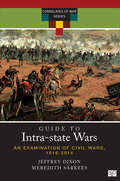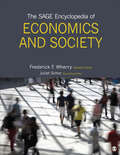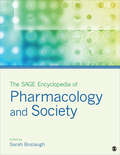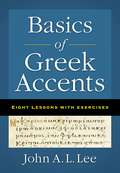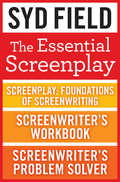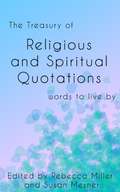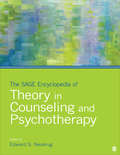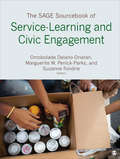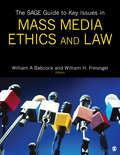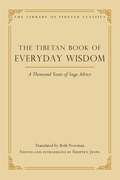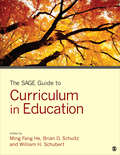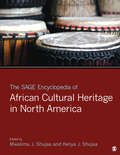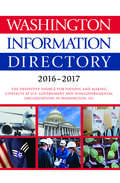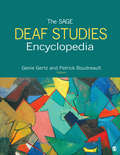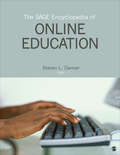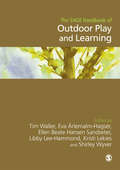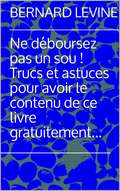- Table View
- List View
A Guide to Intra-state Wars: An Examination of Civil, Regional, and Intercommunal Wars, 1816-2014
by Jeffrey S. Dixon Meredith Reid SarkeesSourcing data and analyses from the rigorous Correlates of War Project, A Guide to Intra-state Wars describes how civil war is defined and categorized and presents data and descriptions for nearly 300 civil wars waged from 1816 to 2014. Analyzing trends over time and regions, this work is the definitive source for understanding the phenomenon of civil war, bringing together an explanation of the theoretical premises driving the Correlates of War Project, along with revisions to categories of, and actors in, civil wars that have been made over the years, and data from the Nations, States and Entities civil war dataset. Features: Provides detailed case studies of nearly 300 civil wars from 1816 to 2014. Combines the systematic study of war with analyses of trends over time and regions. Includes discussion of the different types of actors in international relations and presents data from the Nations, States, and Entities dataset. Considers data describing non-state participants (rebels) in civil wars.
The SAGE Encyclopedia of Economics and Society
by Juliet B. Schor Dr Frederick F. WherryEconomics is the nexus and engine that runs society, affecting societal well-being, raising standards of living when economies prosper or lowering citizens through class structures when economies perform poorly. Our society only has to witness the booms and busts of the past decade to see how economics profoundly affects the cores of societies around the world. From a household budget to international trade, economics ranges from the micro- to the macro-level. It relates to a breadth of social science disciplines that help describe the content of the proposed encyclopedia, which will explicitly approach economics through varied disciplinary lenses. Although there are encyclopedias of covering economics (especially classic economic theory and history), the SAGE Encyclopedia of Economics and Society emphasizes the contemporary world, contemporary issues, and society. Features: 4 volumes with approximately 800 signed articles ranging from 1,000 to 5,000 words each are presented in a choice of print or electronic editions Organized A-to-Z with a thematic Reader's Guide in the front matter groups related entries Articles conclude with References & Future Readings to guide students to the next step on their research journeys Cross-references between and among articles combine with a thorough Index and the Reader's Guide to enhance search-and-browse in the electronic version Pedagogical elements include a Chronology of Economics and Society, Resource Guide, and Glossary This academic, multi-author reference work will serve as a general, non-technical resource for students and researchers within social science programs who seek to better understand economics through a contemporary lens.
The SAGE Encyclopedia of Pharmacology and Society
by Sarah E. BoslaughThe SAGE Encyclopedia of Pharmacology and Society explores the social and policy sides of the pharmaceutical industry and its pervasive influence in society. While many technical STM works explore the chemistry and biology of pharmacology and an equally large number of clinically oriented works focus on use of illegal drugs, substance abuse, and treatment, there is virtually nothing on the immensely huge business (“Big Pharma”) of creating, selling, consuming, and regulating legal drugs. With this new Encyclopedia, the topic of socioeconomic, business and consumer, and legal and ethical issues of the pharmaceutical industry in contemporary society around the world are addressed. Key Features: 800 signed articles, authored by prominent scholars, are arranged A-to-Z and published in a choice of electronic or print formats Although arranged A-to-Z, a Reader's Guide in the front matter groups articles by thematic areas Front matter also includes a Chronology highlighting significant developments in this field All articles conclude with Further Readings and Cross References to related articles Back matter includes an annotated Resource Guide to further research, a Glossary, Appendices (e.g., statistics on the amount and types of drugs prescribed, etc.), and a detailed Index The Index, Reader’s Guide, and Cross References combine for search-and-browse capabilities in the electronic edition The SAGE Encyclopedia of Pharmacology and Society is an authoritative and rigorous source addressing the pharmacology industry and how it influences society, making it a must-have reference for all academic libraries as a source for both students and researchers to utilize.
Basics of Greek Accents: Eight Lessons with Exercises
by John A. LeeBasics of Greek Accents by John A. L. Lee is a compact, student-friendly, and practical guide to accents for students of both classical and biblical Greek. In eight simple lessons students will learn the basics of ancient Greek accentuation.Ideal for beginners who are just learning the language or for intermediate students who have learned some Greek but are unsure of their accents this handy resource avoids theory and concentrates on taking the learner through the essentials in a natural sequence and reinforces learning by means of simple exercises.
The Essential Screenplay (3-Book Bundle): Screenplay, Screenwriter's Workbook, and Screenwriter's Problem Solver
by Syd FieldHollywood’s script guru teaches you how to write a screenplay in the ultimate three-volume guide to writing for film—featuring “the ‘bible’ of screenwriting” (The New York Times). This blockbuster ebook bundle includes: SCREENPLAY • THE SCREENWRITER’S WORKBOOK • THE SCREENWRITER’S PROBLEM SOLVER Syd Field was “the most sought-after screenwriting teacher in the world” according to The Hollywood Reporter. His pioneering insights into structure, concept, and character launched innumerable careers. Now in one handy collection, his invaluable expertise is available to aspiring writers and working professionals alike. The Essential Screenplay contains Syd Field’s Screenplay: The Foundations of Screenwriting, the industry standard for script development; The Screenwriter’s Workbook, a hands-on workshop full of practical exercises for creating successful screenplays; and The Screenwriter’s Problem Solver, a guide to identifying and fixing problems in your latest draft. Throughout, you’ll learn: • why the first ten pages of your script are crucially important • how to visually “grab” the reader from page one • what makes great stories work • the basics of writing dialogue • the essentials of creating great characters • how to adapt a novel, a play, or an article for the screen • the three ways to claim legal ownership of your work • tips for allowing your creative self to break free when you hit the “wall” • how to overcome writer’s block forever Featuring expert analysis of popular films including Pulp Fiction, Thelma & Louise, and the Lord of the Rings trilogy, The Essential Screenplay will transform your initial idea into a screenplay that’s destined for success—and maybe even Cannes.
The Treasury of Religious and Spiritual Quotations
by Rebecca Miller Susan MesnerThe Treasury of Religious and Spiritual Quotations organizes its contents by category: angels and agnosticism, suicide and capital punishment, nature and technology, clergy and repentance. Quotes from wide-ranging religious and spiritual sources, including the Bhagavad Gita, the Talmud, and the Bible, give readers a holistic understanding of some of life's most monumental issues. Based on Ralph L. Woods' seminal reference book of religious sayings, this book is sure to spark reflection and inspire readers of all faiths to ye of little faith--or none at all.
The SAGE Encyclopedia of Theory in Counseling and Psychotherapy
by Dr Edward S. NeukrugThe SAGE Encyclopedia of Theory in Counseling and Psychotherapy is a two-volume source that traces theory and examines the beginnings of counseling and psychotherapy all the way to current trends and movements. This reference work draws together a team of international scholars that examine the global landscape of all the key counseling and psychotherapy theories and the theorists behind them while presenting them in context needed to understand their strengths and weaknesses. This is a quick, one-stop source that gives the reader the “who, what, where, how, and why” of contemporary counseling and psychotherapy theory. From historical context in which the theories were developed to the theoretical underpinnings which drive the theories, this reference encyclopedia has detailed and relevant information for all individuals interested in this subject matter. Features & Benefits: Approximately 335 signed entries fill two volumes available in a choice of print or electronic formats. Back matter includes a Chronology of theory within the field of counseling to help students put individual theories within a broader context. A Master Bibliography and a Resource Guide to key books, journals, and organizations guide students to further resources beyond the encyclopedia. The Reader’s Guide, a detailed Index and the Cross References combine for effective search-and-browse in the e-version and helps students take the next steps in their research journeys. This reference encyclopedia serves as an excellent source for any individual interested in the roots of contemporary counseling and psychotherapy theory. It is ideal for the public and professionals, as well as for students in counselor education programs especially those individuals who are pursuing a Masters level degree.
The SAGE Encyclopedia of Theory in Counseling and Psychotherapy
by Dr Edward S. NeukrugThe SAGE Encyclopedia of Theory in Counseling and Psychotherapy is a two-volume source that traces theory and examines the beginnings of counseling and psychotherapy all the way to current trends and movements. This reference work draws together a team of international scholars that examine the global landscape of all the key counseling and psychotherapy theories and the theorists behind them while presenting them in context needed to understand their strengths and weaknesses. This is a quick, one-stop source that gives the reader the “who, what, where, how, and why” of contemporary counseling and psychotherapy theory. From historical context in which the theories were developed to the theoretical underpinnings which drive the theories, this reference encyclopedia has detailed and relevant information for all individuals interested in this subject matter. Features & Benefits: Approximately 335 signed entries fill two volumes available in a choice of print or electronic formats. Back matter includes a Chronology of theory within the field of counseling to help students put individual theories within a broader context. A Master Bibliography and a Resource Guide to key books, journals, and organizations guide students to further resources beyond the encyclopedia. The Reader’s Guide, a detailed Index and the Cross References combine for effective search-and-browse in the e-version and helps students take the next steps in their research journeys. This reference encyclopedia serves as an excellent source for any individual interested in the roots of contemporary counseling and psychotherapy theory. It is ideal for the public and professionals, as well as for students in counselor education programs especially those individuals who are pursuing a Masters level degree.
The SAGE Sourcebook of Service-Learning and Civic Engagement
by Bola Delano-Oriaran Marguerite W. Penick-Parks Dr Suzanne FondrieService-Learning and Civic Engagement: A Sourcebook focuses on historical, philosophical, social foundations, practices and models of service-learning and civic engagement. The title offers practical, jargon-free chapters applicable to any educational institution as well as community organizations that might consult the work. Key Features Practical, jargon-free chapters applicable to any educational institution as well as community organizations that might consult the work 58 signed chapters are organized into thematic parts, such as Concepts & Theoretical Approaches, Historical & Social Foundations, The Role of Service-Learning in Higher Education, The Role of the Community, Lessons Learned & Future Directions, etc. Thematic parts provide a practical sampling of syllabi, lesson plans, activities and resources, and online websites and databases supporting service-learning. Glossary (key terms commonly used in discussions and research on service-learning and civic engagement) Bibliography of sources consulted in production of the volume This Sourcebook is a scholarly source ideal for any educational institution and academic library as well as public libraries and community organizations that might consult the work on historical, philosophical social foundations, practices and models of service-learning and civic engagement.
The SAGE Sourcebook of Service-Learning and Civic Engagement
by Bola Delano-Oriaran Marguerite W. Penick-Parks Dr Suzanne FondrieService-Learning and Civic Engagement: A Sourcebook focuses on historical, philosophical, social foundations, practices and models of service-learning and civic engagement. The title offers practical, jargon-free chapters applicable to any educational institution as well as community organizations that might consult the work. Key Features Practical, jargon-free chapters applicable to any educational institution as well as community organizations that might consult the work 58 signed chapters are organized into thematic parts, such as Concepts & Theoretical Approaches, Historical & Social Foundations, The Role of Service-Learning in Higher Education, The Role of the Community, Lessons Learned & Future Directions, etc. Thematic parts provide a practical sampling of syllabi, lesson plans, activities and resources, and online websites and databases supporting service-learning. Glossary (key terms commonly used in discussions and research on service-learning and civic engagement) Bibliography of sources consulted in production of the volume This Sourcebook is a scholarly source ideal for any educational institution and academic library as well as public libraries and community organizations that might consult the work on historical, philosophical social foundations, practices and models of service-learning and civic engagement.
The SAGE Guide to Key Issues in Mass Media Ethics and Law
by Dr William Babcock William H. FreivogelThe SAGE Guide to Key Issues in Mass Media Ethics and Law is an authoritative and rigorous two-volume, issues-based reference set that surveys varied views on many of the most contentious issues involving mass media ethics and the law. Divided into six thematic sections covering information from contrasting ethical responsibly and legal rights for both speech and press, newsgathering and access, and privacy to libelous reporting, business considerations, and changing rules with social media and the Internet, the information in this guide is extremely relevant to a variety of audiences. This guide specifically focuses on matters that are likely to be regular front-page headlines concerning topics such as technological threats to privacy, sensationalism in media coverage of high-profile trials, cameras in the courtroom, use of confidential sources, national security concerns and the press, digital duplication and deception, rights of celebrities, plagiarism, and more. Collectively, this guide assesses key contentious issues and legal precedents, noting current ethical and legal trends and likely future directions. Features: Six thematic sections consist of approximately a dozen chapters each written by eminent scholars and practitioners active in the field. Sections open with a general Introduction by the volume editors and conclude with a wrap-up “Outlook” section to highlight likely future trends. Chapters follow a common organizational outline of a brief overview of the issue at hand, historical background and precedent, and presentation of various perspectives (pro, con, mixed) to the issue. “See also” cross references guide readers to related chapters and references and further readings guide users to more in-depth resources for follow-up. This reference guide is an excellent source for the general public, students, and researchers who are interested in expanding their knowledge in mass media and the ethics and law surrounding it.
The SAGE Guide to Key Issues in Mass Media Ethics and Law
by Dr William Babcock William H. FreivogelThe SAGE Guide to Key Issues in Mass Media Ethics and Law is an authoritative and rigorous two-volume, issues-based reference set that surveys varied views on many of the most contentious issues involving mass media ethics and the law. Divided into six thematic sections covering information from contrasting ethical responsibly and legal rights for both speech and press, newsgathering and access, and privacy to libelous reporting, business considerations, and changing rules with social media and the Internet, the information in this guide is extremely relevant to a variety of audiences. This guide specifically focuses on matters that are likely to be regular front-page headlines concerning topics such as technological threats to privacy, sensationalism in media coverage of high-profile trials, cameras in the courtroom, use of confidential sources, national security concerns and the press, digital duplication and deception, rights of celebrities, plagiarism, and more. Collectively, this guide assesses key contentious issues and legal precedents, noting current ethical and legal trends and likely future directions. Features: Six thematic sections consist of approximately a dozen chapters each written by eminent scholars and practitioners active in the field. Sections open with a general Introduction by the volume editors and conclude with a wrap-up “Outlook” section to highlight likely future trends. Chapters follow a common organizational outline of a brief overview of the issue at hand, historical background and precedent, and presentation of various perspectives (pro, con, mixed) to the issue. “See also” cross references guide readers to related chapters and references and further readings guide users to more in-depth resources for follow-up. This reference guide is an excellent source for the general public, students, and researchers who are interested in expanding their knowledge in mass media and the ethics and law surrounding it.
A Guide to Intra-state Wars: An Examination of Civil, Regional, and Intercommunal Wars, 1816-2014
by Jeffrey S. Dixon Meredith Reid SarkeesSourcing data and analyses from the rigorous Correlates of War Project, A Guide to Intra-state Wars describes how civil war is defined and categorized and presents data and descriptions for nearly 300 civil wars waged from 1816 to 2014. Analyzing trends over time and regions, this work is the definitive source for understanding the phenomenon of civil war, bringing together an explanation of the theoretical premises driving the Correlates of War Project, along with revisions to categories of, and actors in, civil wars that have been made over the years, and data from the Nations, States and Entities civil war dataset. Features: Provides detailed case studies of nearly 300 civil wars from 1816 to 2014. Combines the systematic study of war with analyses of trends over time and regions. Includes discussion of the different types of actors in international relations and presents data from the Nations, States, and Entities dataset. Considers data describing non-state participants (rebels) in civil wars.
The Tibetan Book of Everyday Wisdom (Library of Tibetan Classics #1)
by Beth Newman Jinpa ThuptenEnjoy popular Tibetan collections of advice, fables, and aphorisms for following the way of the wise and avoiding the paths of fools.The Tibetan Book of Everdyay Wisdom: A Thousand Years of Sage Advice presents a genre of Tibetan works known as “wise sayings” (lekshé). While most Tibetan literature focuses on the Buddhist path, “wise sayings” literature has traditionally been a centerpiece of secular education in Tibet and in the cultivation of social mores and an honorable way of life. Drawing inspiration from classical Indian literature on human virtue and governance (nitisastra), including the folktales in the Pañcatantra, the authors of these Tibetan works strove to educate young minds in the ways of the civilized world, especially by distinguishing the conduct of the wise from that of the foolish. This anthology includes some of the best-loved classics of Tibetan literature, such as Sakya Pandita’s Jewel Treasury of Wise Sayings, Panchen Sönam Drakpa’s Ganden Wise Sayings, and Gungthang’s Treatise on Trees and Treatise on Water. The final work is the intriguing Kaché Phalu’s Advice. Ostensibly written by a wise Tibetan Muslim, this versified text enjoys great popularity within Tibetan-speaking communities, such that most people are able to recite at least a few verses from memory.
The SAGE Guide to Curriculum in Education
by Dr Ming Fang He Dr Brian D. Schultz Dr William H. SchubertThe SAGE Guide to Curriculum in Education integrates, summarizes, and explains, in highly accessible form, foundational knowledge and information about the field of curriculum with brief, simply written overviews for people outside of or new to the field of education. This Guide supports study, research, and instruction, with content that permits quick access to basic information, accompanied by references to more in-depth presentations in other published sources. This Guide lies between the sophistication of a handbook and the brevity of an encyclopedia. It addresses the ties between and controversies over public debate, policy making, university scholarship, and school practice. While tracing complex traditions, trajectories, and evolutions of curriculum scholarship, the Guide illuminates how curriculum ideas, issues, perspectives, and possibilities can be translated into public debate, school practice, policy making, and life of the general public focusing on the aims of education for a better human condition. 55 topical chapters are organized into four parts: Subject Matter as Curriculum, Teachers as Curriculum, Students as Curriculum, and Milieu as Curriculum based upon the conceptualization of curriculum commonplaces by Joseph J. Schwab: subject matter, teachers, learners, and milieu. The Guide highlights and explicates how the four commonplaces are interdependent and interconnected in the decision-making processes that involve local and state school boards and government agencies, educational institutions, and curriculum stakeholders at all levels that address the central curriculum questions: What is worthwhile? What is worth knowing, needing, experiencing, doing, being, becoming, overcoming, sharing, contributing, wondering, and imagining? The Guide benefits undergraduate and graduate students, curriculum professors, teachers, teacher educators, parents, educational leaders, policy makers, media writers, public intellectuals, and other educational workers. Key Features: Each chapter inspires readers to understand why the particular topic is a cutting edge curriculum topic; what are the pressing issues and contemporary concerns about the topic; what historical, social, political, economic, geographical, cultural, linguistic, ecological, etc. contexts surrounding the topic area; how the topic, relevant practical and policy ramifications, and contextual embodiment can be understood by theoretical perspectives; and how forms of inquiry and modes of representation or expression in the topic area are crucial to develop understanding for and make impact on practice, policy, context, and theory. Further readings and resources are provided for readers to explore topics in more details.
The SAGE Encyclopedia of African Cultural Heritage in North America
by Mwalimu J. Shujaa Kenya J. ShujaaThe Encyclopedia of African Cultural Heritage in North America provides an accessible ready reference on the retention and continuity of African culture within the United States. Our conceptual framework holds, first, that culture is a form of self-knowledge and knowledge about self in the world as transmitted from one person to another. Second, that African people continuously create their own cultural history as they move through time and space. Third, that African descended people living outside of Africa are also contributors to and participate in the creation of African cultural history. Entries focus on illuminating Africanisms (cultural retentions traceable to an African origin) and cultural continuities (ongoing practices and processes through which African culture continues to be created and formed). Thus, the focus is more culturally specific and less concerned with the broader transatlantic demographic, political and geographic issues that are the focus of similar recent reference works. We also focus less on biographies of individuals and political and economic ties and more on processes and manifestations of African cultural heritage and continuity. FEATURES: A two-volume A-to-Z work, available in a choice of print or electronic formats 350 signed entries, each concluding with Cross-references and Further Readings 150 figures and photos Front matter consisting of an Introduction and a Reader’s Guide organizing entries thematically to more easily guide users to related entries Signed articles concluding with cross-references
Washington Information Directory 2016-2017
by Cq PressWashington Information Directory is this essential one-stop resource for information on U.S. governmental and nongovernmental agencies and organizations. This thoroughly researched guide provides capsule descriptions that help users quickly and easily find the right person at the right organizations. Washington Information Directory offers three easy ways to find information: by name, by organization, and through detailed subject indexes. It also includes dozens of resource boxes on particular topics and organization charts for federal agencies and NGOs. With more than 10,000 listings, the 2016-2017 edition of Washington Information Directory features concise organization descriptions and contact information for: Federal departments and agencies Congressional members, committees, and organizations Nongovernemental and international organizations Courts and judiciary organization As well as contact information for: Governors and other state officials U.S. ambassadors and foreign diplomats Nearly 200 House and Senate caucuses
The SAGE Deaf Studies Encyclopedia
by Genie Gertz Dr Patrick BoudreaultThe time has come for a new in-depth encyclopedic collection of articles defining the current state of Deaf Studies at an international level and using the critical and intersectional lens encompassing the field. The emergence of Deaf Studies programs at colleges and universities and the broadened knowledge of social sciences (including but not limited to Deaf History, Deaf Culture, Signed Languages, Deaf Bilingual Education, Deaf Art, and more) have served to expand the activities of research, teaching, analysis, and curriculum development. The field has experienced a major shift due to increasing awareness of Deaf Studies research since the mid-1960s. The field has been further influenced by the Deaf community’s movement, resistance, activism and politics worldwide, as well as the impact of technological advances, such as in communications, with cell phones, computers, and other devices. A major goal of this new encyclopedia is to shift focus away from the “Medical/Pathological Model” that would view Deaf individuals as needing to be “fixed” in order to correct hearing and speaking deficiencies for the sole purpose of assimilating into mainstream society. By contrast, The Deaf Studies Encyclopedia seeks to carve out a new and critical perspective on Deaf Studies with the focus that the Deaf are not a people with a disability to be treated and “cured” medically, but rather, are members of a distinct cultural group with a distinct and vibrant community and way of being.
The SAGE Encyclopedia of Economics and Society
by Juliet B. Schor Dr Frederick F. WherryEconomics is the nexus and engine that runs society, affecting societal well-being, raising standards of living when economies prosper or lowering citizens through class structures when economies perform poorly. Our society only has to witness the booms and busts of the past decade to see how economics profoundly affects the cores of societies around the world. From a household budget to international trade, economics ranges from the micro- to the macro-level. It relates to a breadth of social science disciplines that help describe the content of the proposed encyclopedia, which will explicitly approach economics through varied disciplinary lenses. Although there are encyclopedias of covering economics (especially classic economic theory and history), the SAGE Encyclopedia of Economics and Society emphasizes the contemporary world, contemporary issues, and society. Features: 4 volumes with approximately 800 signed articles ranging from 1,000 to 5,000 words each are presented in a choice of print or electronic editions Organized A-to-Z with a thematic Reader's Guide in the front matter groups related entries Articles conclude with References & Future Readings to guide students to the next step on their research journeys Cross-references between and among articles combine with a thorough Index and the Reader's Guide to enhance search-and-browse in the electronic version Pedagogical elements include a Chronology of Economics and Society, Resource Guide, and Glossary This academic, multi-author reference work will serve as a general, non-technical resource for students and researchers within social science programs who seek to better understand economics through a contemporary lens.
The SAGE Encyclopedia of Pharmacology and Society
by Sarah E. BoslaughThe SAGE Encyclopedia of Pharmacology and Society explores the social and policy sides of the pharmaceutical industry and its pervasive influence in society. While many technical STM works explore the chemistry and biology of pharmacology and an equally large number of clinically oriented works focus on use of illegal drugs, substance abuse, and treatment, there is virtually nothing on the immensely huge business (“Big Pharma”) of creating, selling, consuming, and regulating legal drugs. With this new Encyclopedia, the topic of socioeconomic, business and consumer, and legal and ethical issues of the pharmaceutical industry in contemporary society around the world are addressed. Key Features: 800 signed articles, authored by prominent scholars, are arranged A-to-Z and published in a choice of electronic or print formats Although arranged A-to-Z, a Reader's Guide in the front matter groups articles by thematic areas Front matter also includes a Chronology highlighting significant developments in this field All articles conclude with Further Readings and Cross References to related articles Back matter includes an annotated Resource Guide to further research, a Glossary, Appendices (e.g., statistics on the amount and types of drugs prescribed, etc.), and a detailed Index The Index, Reader’s Guide, and Cross References combine for search-and-browse capabilities in the electronic edition The SAGE Encyclopedia of Pharmacology and Society is an authoritative and rigorous source addressing the pharmacology industry and how it influences society, making it a must-have reference for all academic libraries as a source for both students and researchers to utilize.
The SAGE Encyclopedia of Online Education
by Dr Steven L. DanverOnline education, both by for-profit institutions and within traditional universities, has seen recent tremendous growth and appeal - but online education has many aspects that are not well understood. The SAGE Encyclopedia of Online Education provides a thorough and engaging reference on all aspects of this field, from the theoretical dimensions of teaching online to the technological aspects of implementing online courses—with a central focus on the effective education of students. Key topics explored through over 350 entries include: · Technology used in the online classroom · Institutions that have contributed to the growth of online education · Pedagogical basis and strategies of online education · Effectiveness and assessment · Different types of online education and best practices · The changing role of online education in the global education system
The SAGE Encyclopedia of Online Education
by Dr Steven L. DanverOnline education, both by for-profit institutions and within traditional universities, has seen recent tremendous growth and appeal - but online education has many aspects that are not well understood. The SAGE Encyclopedia of Online Education provides a thorough and engaging reference on all aspects of this field, from the theoretical dimensions of teaching online to the technological aspects of implementing online courses—with a central focus on the effective education of students. Key topics explored through over 350 entries include: · Technology used in the online classroom · Institutions that have contributed to the growth of online education · Pedagogical basis and strategies of online education · Effectiveness and assessment · Different types of online education and best practices · The changing role of online education in the global education system
The SAGE Handbook of Outdoor Play and Learning
by Professor Tim Waller Dr Eva Ärlemalm-Hagsér Dr Shirley Wyver Ellen Beate Hansen Sandseter Kristi S. Lekies Libby Lee-HammondThere has been a growing academic interest in the role of outdoor spaces for play in a child's development. This text represents a coordinated and comprehensive volume of international research on this subject edited by members of the well-established European Early Childhood Education Research Association Outdoor Play and Learning SIG (OPAL). Chapters written by authors from Europe, North and South America, Australasia and Asia Pacific countries are organised into six sections: Theoretical Frameworks and Conceptual Approaches for Understanding Outdoor Play & Learning Critical Reflections on Policy and Regulation in Outdoor Play & Learning Children's Engagement with Nature, Sustainability and Children's Geographies Diverse Contexts and Inclusion in Children's Outdoor Play Environments Methodologies for Researching Outdoor Play and Learning Links Between Research and Practice
The SAGE Handbook of Outdoor Play and Learning
by Professor Tim Waller Dr Eva Ärlemalm-Hagsér Dr Shirley Wyver Ellen Beate Hansen Sandseter Kristi S. Lekies Libby Lee-HammondThere has been a growing academic interest in the role of outdoor spaces for play in a child's development. This text represents a coordinated and comprehensive volume of international research on this subject edited by members of the well-established European Early Childhood Education Research Association Outdoor Play and Learning SIG (OPAL). Chapters written by authors from Europe, North and South America, Australasia and Asia Pacific countries are organised into six sections: Theoretical Frameworks and Conceptual Approaches for Understanding Outdoor Play & Learning Critical Reflections on Policy and Regulation in Outdoor Play & Learning Children's Engagement with Nature, Sustainability and Children's Geographies Diverse Contexts and Inclusion in Children's Outdoor Play Environments Methodologies for Researching Outdoor Play and Learning Links Between Research and Practice
Ne déboursez pas un sou ! Trucs et astuces pour avoir le contenu de ce livre gratuitement...
by Bernard Levine Jephté Bikoul HenockFaites-vous plaisir avec plein de cadeaux gratuits dès aujourd’hui ! Emportez tout ce que vous voulez... c’est totalement gratuit ! Vous serez surpris quand vous verrez ce que vous pouvez avoir gratuitement. Ce livre déborde de magnifiques cadeaux gratuits, rien que pour vous. Vous trouverez ici tout ce qu’il vous faut et cela gratuitement : du mobilier, du café et du thé, en passant par des vêtements. Et en plus on y trouve également des autographes de célébrités, du papier peint, des jouets... de la déco pour maison..., y compris des plantes de jardin et des arbres, des appareils photo numériques, des tableaux de peinture, le tout sans rien dépenser ! ...Et bien d’autres magnifiques cadeaux gratuits bien plus nombreux, qui n’attendent que vous ! La valeur de tous ces cadeaux se chiffre en plusieurs milliers de dollars... eh oui, ils sont tous à vous... entièrement gratuit... vous n’avez pas à dépenser un sou... prenez-les tous, profitez-en et faites-vous plaisir. Ce livre fera apparaître un sourire sur votre visage et vous rendra joyeux.
